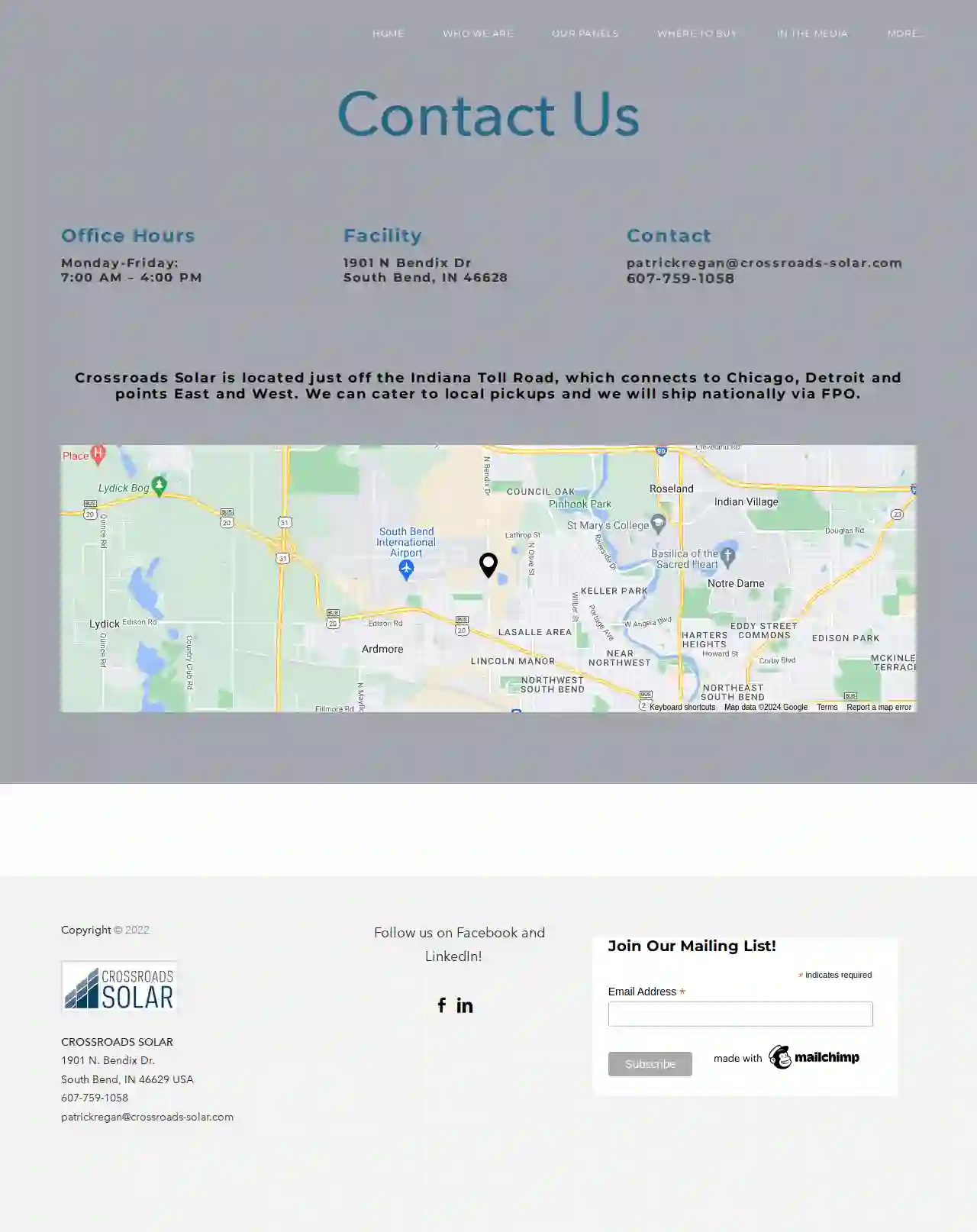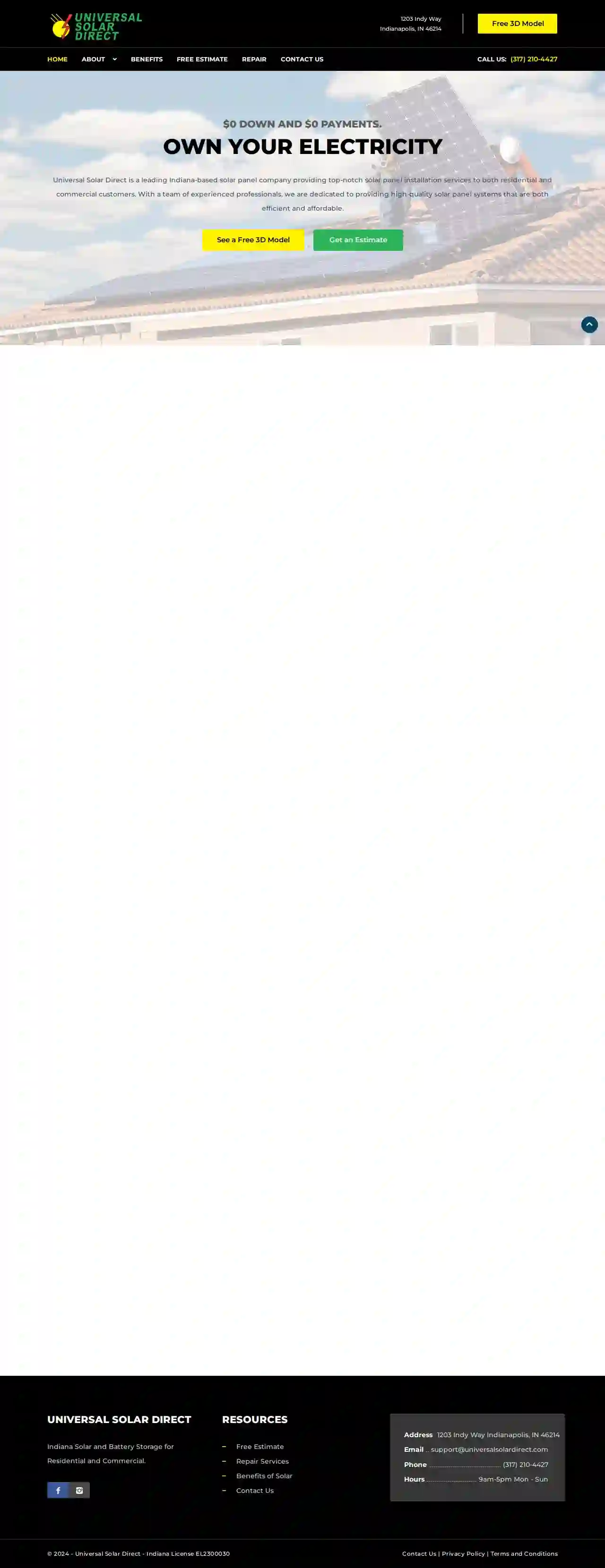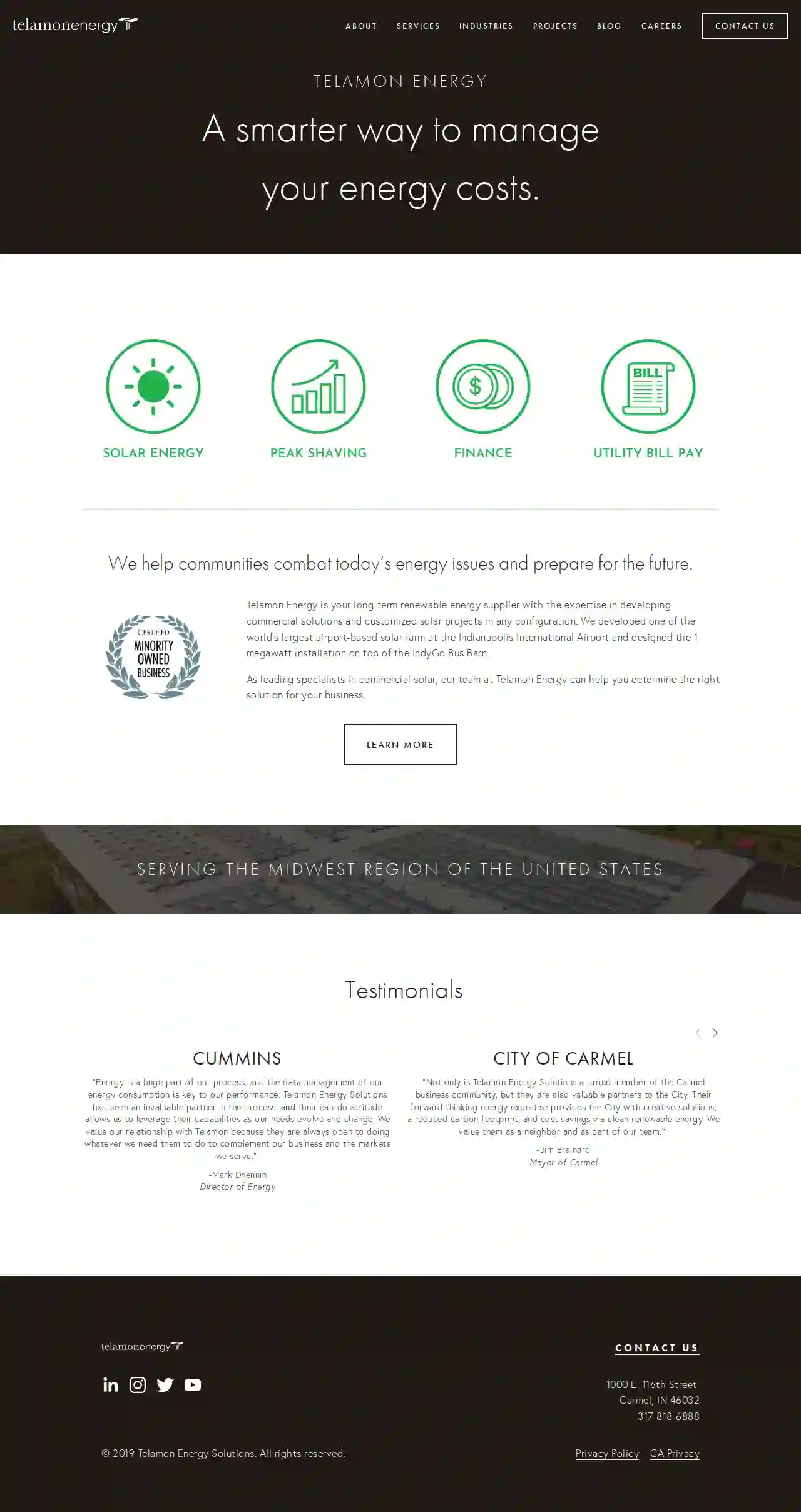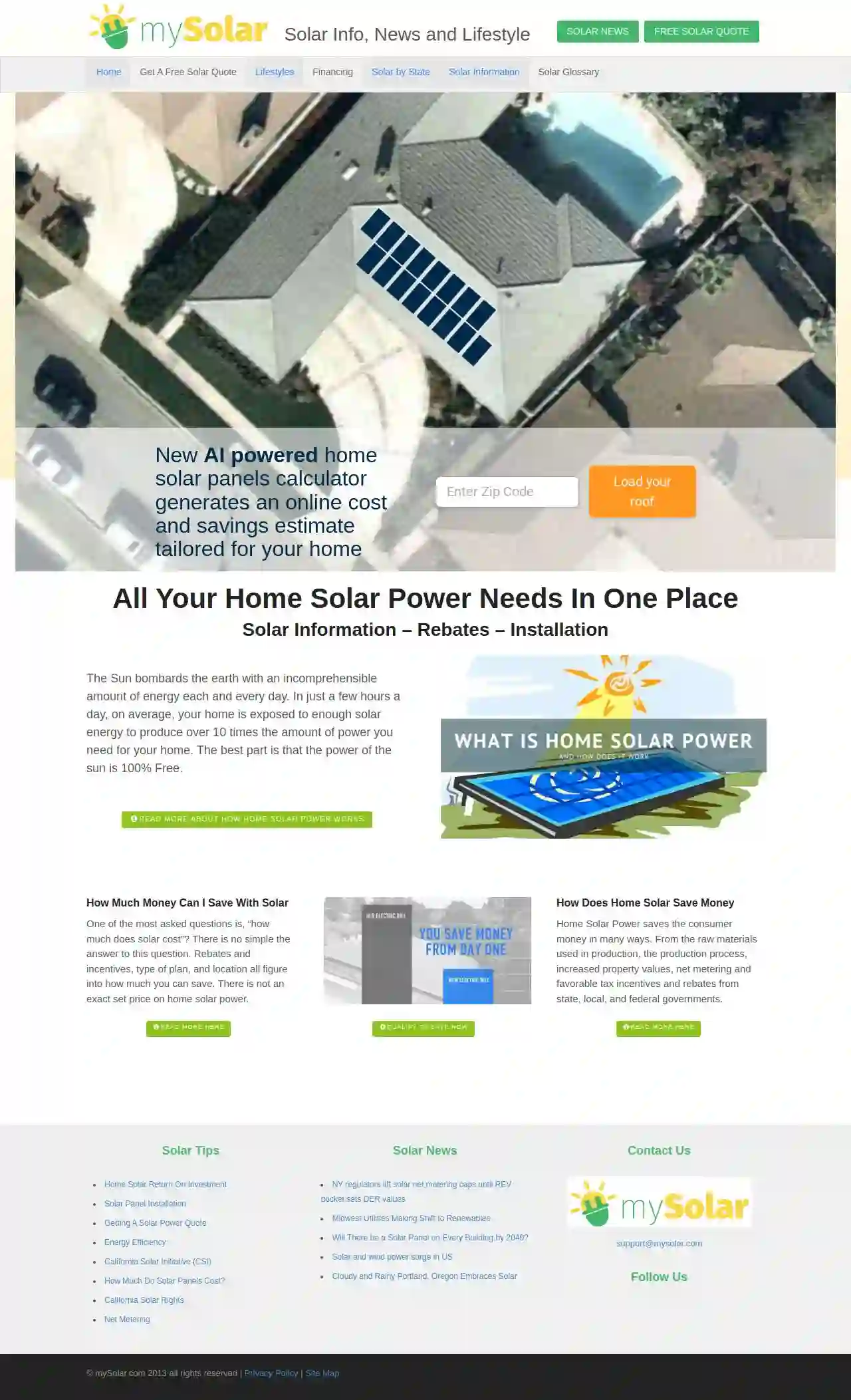Solar Installers North Vernon
Find top Solar Panel Installers in North Vernon
Receive 3 FREE Solar Panel Installation Near Me quotes for your project today! Compare profiles, reviews, accreditations, portfolio, etc... and choose the best offer.

Crossroads Solar
4.33 reviews1901 N Bendix Dr, South Bend, IN 46628, 46628, USCrossroads Solar is a socially conscious company committed to people and the planet. Our goal is to produce top-quality solar panels with people who have made mistakes, creating second chances and a greener earth one panel at a time. Our employees are released felons who have served their time and earned the opportunity to reenter the workforce with dignity.
- Services
- Why Us?
- Accreditations
- Our Team
- Testimonials
- Gallery
Get Quote
Universal Solar Direct of Indiana
58 reviews1203 Indy Way, Indianapolis, IN 46214, 46214, USUniversal Solar Direct is a leading Indiana-based solar panel company providing top-notch solar panel installation services to both residential and commercial customers. With a team of experienced professionals, we are dedicated to providing high-quality solar panel systems that are both efficient and affordable.
- Services
- Why Us?
- Accreditations
- Our Team
- Testimonials
- Gallery
Get Quote
Indy Solar Solutions LLC
54 reviews123 Main St, Suite 100, Indianapolis, 46201, USIndy Solar Solutions, LLC is a company that specializes in providing solar power solutions to homeowners. They believe in a green future and aim to make solar power accessible to all homeowners, regardless of their budget. They offer a variety of Tier 1 solar module and energy storage solutions that can be customized to fit your home and budget. They also offer a full-service experience, from design and installation to energization.
- Services
- Why Us?
- Accreditations
- Our Team
- Testimonials
- Gallery
Get Quote
Hightec Solar
4.515 reviews1000 IN-212, Michigan City, 46360, USHightec Solar is an American solar panel manufacturer that is committed to manufacturing the highest quality solar panels available. Our products are made to meet the demands of our customers who have a need for an affordable, high-performance solar power system. Whether you’re building your first off-grid solar power system or wishing your existing one was more efficient than before, Hightec Solar can help!
- Services
- Why Us?
- Accreditations
- Our Team
- Testimonials
- Gallery
Get Quote
Solar America Solutions
Modern Thermal Design, Indianapolis, IN, 1234 Solar Way, 46268, USModern Thermal Design specializes in large and complex commercial made-in-America solar panels for businesses, including solar photovoltaic and UV hot water solar or a combination of the two. With over 30 years of experience, they have the technical expertise and real-time experience to manage any commercial, industrial, institutional, or government sustainability project. Their engineering and auditing personnel will thoroughly evaluate your property and energy usage, identify peak and off-peak hours and design an American-made solar system customized to your business.
- Services
- Why Us?
- Accreditations
- Our Team
- Testimonials
- Gallery
Get Quote
Telamon Energy
1000 E. 116th Street, Carmel, 46032, USTelamon Energy, a division of Telamon, is a national solar partner with the expertise to design, develop and immediately deploy solar arrays in any configuration. Our highly trained team takes pride in delivering beautiful, well-engineered solar arrays. We have intentionally remained a boutique energy firm to ensure each client receives the dedicated attention and expert insight on which our reputation was built. Our team evaluates each clients’ needs fully and holistically, first assessing and then presenting custom and tailored solutions. Having designed and financed North America’s largest airport-based solar farm at the Indianapolis International Airport and the nation’s largest rooftop installations for a transit authority (the IndyGo Bus Barn), Telamon is a respected leader in solar design, engineering, traditional and tax equity financing, RFP and construction management. ValuesH2S2 – Honesty, Harmony, Simplicity and Stewardship. Honesty internally with our employees and shareholders and externally with our customers, vendors, and community, promotes harmony in all our relationships. Simplicity, being easy to understand or do, doesn’t always correlate to a simple path but allows us to be stewards of our resources in order to deliver for those who have entrusted us. These four values are the cornerstones of how we do business and the foundation upon which we support our customers, employees, shareholders, and community. VisionTelamon’s vision is “to be a load bearing support across generations”. We strive to fulfill this every day through the flawless execution of our mission and through the application of Telamon’s core values concept “H2S2”, Honesty, Harmony, Simplicity and Stewardship. Our ApproachOur goal is to create optimal and customized energy solutions for our customers.We do this by practicing the following approach. We genuinely care about yourlong term goals. we look to build a lasting partnership with you. we help you find a smarter wayto manage your costs. our energy experts becomepart of your team. Meet our team albert chenmanaging partnerAlbert founded Telamon Corporation in 1985, growing it to become Indiana’s largest minority owned business. Albert launched Telamon Energy because he sees the value, growth, and importance of the energy sector in today’s market. He has an M.S. in Mathematical Sciences from Portland State University. REGGIE HENDERSONPresidentReggie has over 30 years of experience in corporate management, business administration, and government affairs. Reggie is responsible for leading the company’s overall strategy and direction.
- Services
- Why Us?
- Our Team
- Testimonials
- Gallery
Get Quote
Star Solar Specialists
4.912 reviewsJeffersonville, IN, 509 Ohio Avenue, 47130, USStar Solar Specialists is a family-owned and operated solar power installation company based in Jeffersonville, Indiana. They provide affordable solar power options to Southern Indiana and North Central Kentucky. The company has been dedicated to bringing affordable solar power options to Kentuckiana since 2015.
- Services
- Why Us?
- Gallery
Get Quote
Solar Energy Systems LLC
4.837 reviewsNappanee, IN, USA, 123 Solar Lane, 46550, USSolar Energy Systems is a leading solar installation company in Nappanee, Indiana, dedicated to providing clean solar energy solutions for residential, commercial, agricultural, and recreational vehicle applications.
- Services
- Why Us?
- Accreditations
- Our Team
- Testimonials
- Gallery
Get Quote
Ohio Valley Solar
4.729 reviews7765 Park Place Dr., Newburgh, IN, 47630, USOhio Valley Solar is a residential and commercial solar company committed to making a difference using solar power. We simplify the process. The goal of our residential and commercial solar installers is to educate consumers about the world of solar energy and show homeowners the many benefits of going solar! We harness the power of the sun to meet your energy needs. Our team is leading by example in our commitment to sustainability. We provide reliable, clean, and cost-effective energy solutions that not only benefit our clients but also help to reduce our collective reliance on fossil fuels and protect the environment for future generations. Ohio Valley Solar Is 100% powered by the sun and recycles 95% of its construction waste. We provide fast and easy solar panel installation. Let Ohio Valley Solar show you how to save thousands every year. Contact us today to get a free estimation of residential and commercial solar panels for your home.
- Services
- Why Us?
- Accreditations
- Gallery
Get Quote
My Solar Energy
123 Solar Way, Beverly Hills, CA, 90210, USmySolar is a leading provider of home solar power solutions, offering comprehensive information on solar energy, its benefits, and how to get started with solar power for your home. The website provides detailed insights into the world of solar energy, including solar news, lifestyle, financing options, and state-specific solar initiatives.
- Services
- Why Us?
- Accreditations
- Our Team
- Testimonials
- Gallery
Get Quote
Over 4,210+ Solar Companies registered
Our solar companies operate in North Vernon and beyond!
SolarCompaniesHub has curated and vetted Top Solar Installers in and around North Vernon. Find a top & trustworthy pro today.
Frequently Asked Questions About Solar Installers
- Adequate Sunlight: Unobstructed sunlight for a significant portion of the day.
- Sufficient Space: Enough space to accommodate the desired number of panels.
- Structural Integrity: A strong roof structure capable of supporting the weight of the panels.
- Appropriate Orientation and Tilt: Ideally, the roof should face south (in the Northern Hemisphere) or north (in the Southern Hemisphere) with a tilt angle close to the latitude of your location. However, other orientations and tilts can still be effective.
- System size (measured in kilowatts, or kW)
- Type of solar panels (monocrystalline, polycrystalline, thin-film)
- Roof complexity (pitch, size, obstructions)
- Labor costs in your area
- Available incentives and rebates
How do I know if my roof is suitable for solar panels?
How do solar panels work?
Will solar panels work during cloudy days or at night?
What is the average cost of solar panel installation in USA?
How do I know if my roof is suitable for solar panels?
- Adequate Sunlight: Unobstructed sunlight for a significant portion of the day.
- Sufficient Space: Enough space to accommodate the desired number of panels.
- Structural Integrity: A strong roof structure capable of supporting the weight of the panels.
- Appropriate Orientation and Tilt: Ideally, the roof should face south (in the Northern Hemisphere) or north (in the Southern Hemisphere) with a tilt angle close to the latitude of your location. However, other orientations and tilts can still be effective.
How do solar panels work?
Will solar panels work during cloudy days or at night?
What is the average cost of solar panel installation in USA?
- System size (measured in kilowatts, or kW)
- Type of solar panels (monocrystalline, polycrystalline, thin-film)
- Roof complexity (pitch, size, obstructions)
- Labor costs in your area
- Available incentives and rebates